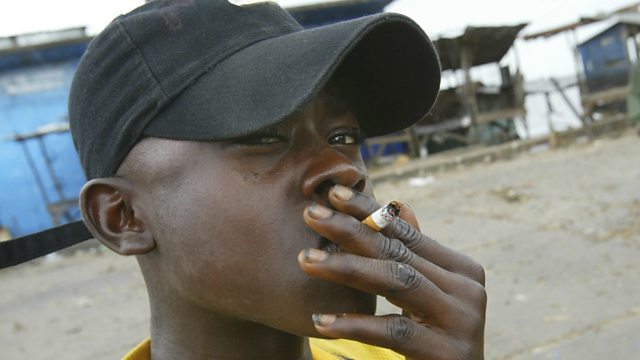
Smoking Rises in African Youth
Young smokers in Africa; data scraping; ocean rubbish; Northern white rhino; SA mobile health clinic; solar powered drones; does anything stand still?
The number of young people who smoke is on the rise in sub-Saharan Africa while rate of take-up of the habit by youth is falling in Europe and North America. Africa's tobacco trend was a key issue of concern for experts at the recent World Conference on Tobacco or Health in Cape Town. Doctors dread the consequences for Africa's young smokers as lung disease caused by tobacco will be exacerbated by the region's high HIV and TB rates. One describes the situation as 'a perfect storm'. Hannah McNeish reports from Cape Town.
Data Scraping
The story of how Cambridge Analytica had scraped Facebook data in its attempt to influence voting behaviour has been reported widely this week. Andrew Steele, a medical researcher at the Crick Institute in London, explains how data mining or scraping actually works and how it is used by many scientists to find ways of improving human health.
The Great Pacific Garbage Patch
After three months collecting 3 million bits of rubbish from an area in the ocean the size of Iran, researchers now estimate there are 1.8 trillion pieces of plastic floating around what is known as the Great Pacific Garbage Patch. The patch lies between California and Hawaii. The next step: cleaning it with a 600 metre floating boom, starting this summer. Roland Pease speaks to chief scientist Laurent Lebreton.
Saving the Northern White Rhino
Genetic treatments could help save the northern white rhino. Only two females remain in the world following the death of the last male this week. Jan Stejskal, director of international projects at Dvr Králové Zoo in the Czech Republic, which technically owns the three rhinos, arrived in the Ol Pejeta reserve in Kenya early this week, as the keepers prepared to take precious tissue and semen samples from Sudan before euthanising him, to be used in future attempts at artificial fertilisation. He spoke to Roland Pease about how scientists want to use IVF and stem cell techniques to try to conserve the subspecies.
Mobile Clinic
From Kenya to South Africa - and to one of the country's poorest regions - rural Kwazulu Natal - where scientists are about to launch one of the most ambitious medical research projects ever in sub Saharan Africa. Rates of both HIV/AIDS and Tuberculosis are extremely high here - about 30% of the population is HIV positive and TB is the cause of 30% of all deaths. So from May staff from the Africa Health Research Institute will be taking mobile clinics around the region with the aim of screening 50,000 people. Claudia Hammond spoke to the Institute's Director Deenan Pillay.
Drone Technology
The latest drone hardware has been unveiled at an aviation show in Belgrade. The technology is designed to fly for 24 hours and can be used for surveillance or communications uses. Before the unveiling, Gareth Mitchell managed to get a sneak preview of some of the machines from Petar Matunovic and Milos Matejic of the company CTT, which stands for Composite Technology Team.
And finally….following a question from a listener, we find out whether anything in the universe stands still. Professor Steve Biller, a physicist at Oxford University says it’s all relative. Or rather, it’s all about relativity. He explained to Marnie Chesterton how, if you can travel as fast as the speed of light, everything stands still.
The Science Hour was presented by Marnie Chesterton with comments from Claire Ainsworth.
Producer: Katy Takatsuki
(Photo: An African boy smoking a cigarette. Credit: Chris Hondros Getty Images)
Last on
More episodes
Previous
Broadcasts
- Sat 24 Mar 2018 12:06GMTÃÛÑ¿´«Ã½ World Service Americas and the Caribbean
- Sat 24 Mar 2018 23:06GMTÃÛÑ¿´«Ã½ World Service Australasia, UK DAB/Freeview, South Asia, Europe and the Middle East & East Asia only
- Sun 25 Mar 2018 23:06GMTÃÛÑ¿´«Ã½ World Service Online
Podcast
-
![]()
Unexpected Elements
The news you know, the science you don't

